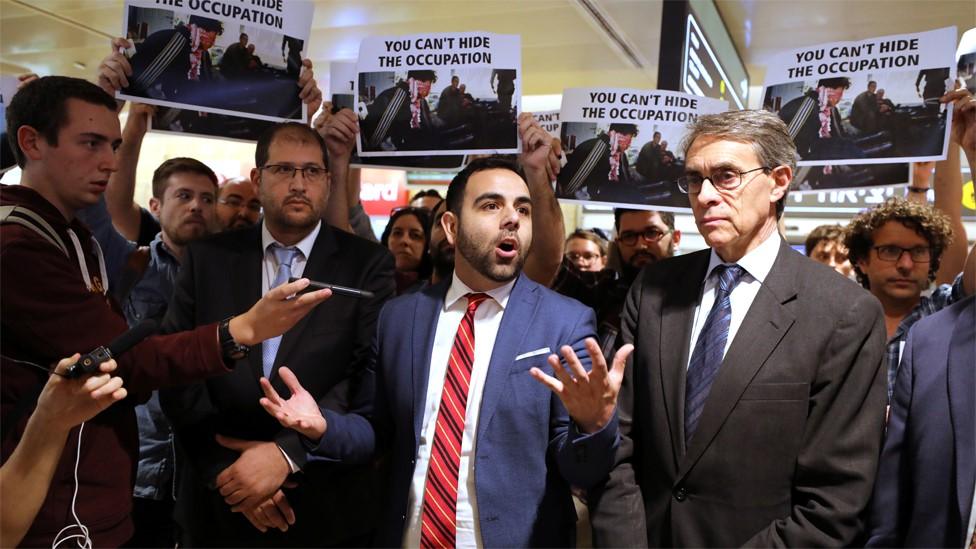Israel's deportation of Human Rights Watch activist condemned
- Published

Omar Shakir vowed to continue investigating and reporting human rights abuses
Human Rights Watch has accused the Israeli authorities of an "intensifying assault on human rights" following the deportation of one of its activists.
The interior ministry revoked the work permit of US citizen Omar Shakir last year under a law that bars foreigners who have supported boycotts of Israel.
HRW appealed, but the Supreme Court upheld the decision earlier this month.
Mr Shakir will continue as the group's Israel and Palestine director but he will be based in neighbouring Jordan.
"Israel today joins the likes of Venezuela, Iran, and Egypt in barring Human Rights Watch researchers, but it, too, will not succeed in hiding its human rights abuses," said Kenneth Roth, HRW's executive director, who accompanied Mr Shakir as he flew out of Tel Aviv's Ben Gurion airport on Monday.
"This decision shows why the international community must reboot its approach to Israel's deteriorating human rights record. A government that expels a leading human rights investigator is not likely to stop its systematic oppression of Palestinians under occupation without much greater international pressure."
Allow X content?
This article contains content provided by X. We ask for your permission before anything is loaded, as they may be using cookies and other technologies. You may want to read X’s cookie policy, external and privacy policy, external before accepting. To view this content choose ‘accept and continue’.

The executive director of the Israeli human rights group, B'Tselem, warned that Mr Shakir's deportation was "part of a broader, ongoing campaign waged by the Israeli government to silence any effective opposition to the prolonged occupation".
The Israeli ministry of strategic affairs accused Mr Shakir of "zealously" promoting boycotts against the country.
"Israel, like any sane country, has the right to decide who is given the freedom to enter and work within its borders," a statement said.
When it revoked Mr Shakir's work permit in May 2018, the interior ministry asserted that he was an "activist" for the Boycott, Divestment and Sanctions (BDS) movement, which campaigns for a complete boycott of Israel over its policies towards the Palestinians.
The ministry cited statements and social media posts that had been made by Mr Shakir over the previous 10 years, almost all of them predating his HRW role.
Israel says that BDS opposes the country's very existence and is motivated by anti-Semitism - something the movement denies. In 2017, the Israeli parliament passed a law refusing entry to people with links to BDS.
HRW rejected the Israeli government's portrayal of Mr Shakir, saying he neither supported nor opposed BDS.
It stressed that as its representative he had called on companies to stop working in or with Jewish settlements in the occupied West Bank, and had not called for a consumer boycott of those companies. The settlements are widely considered illegal under international law, though Israel - and the US under the Trump administration - dispute this.
HRW also argued that the 2017 law violated constitutionally protected fundamental liberties, including freedom of expression and the prohibition of discrimination based on political or ideological convictions.
Former Israeli officials and human rights groups filed motions to join Mr Shakir's appeal against the deportation order at the Supreme Court, while the European Union and United Nations Secretary General António Guterres called on the Israeli authorities not to deport him.
On 5 November, the Supreme Court ruled that Mr Shakir's position constituted grounds for deportation under the 2017 law, and gave him 20 days to leave Israel.
Israeli Interior Minister Arye Deri said at the time: "Anyone who works against the state should know that we will not allow him to live or work here."